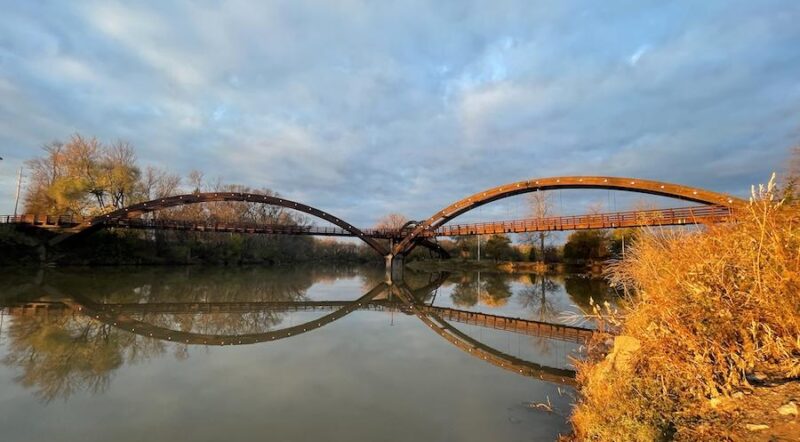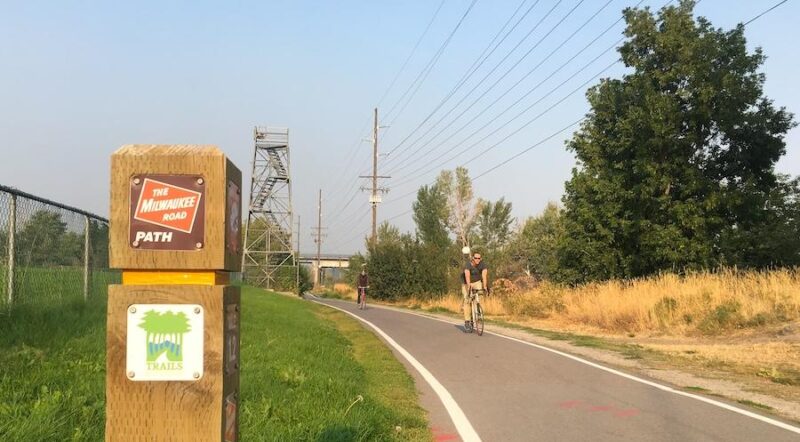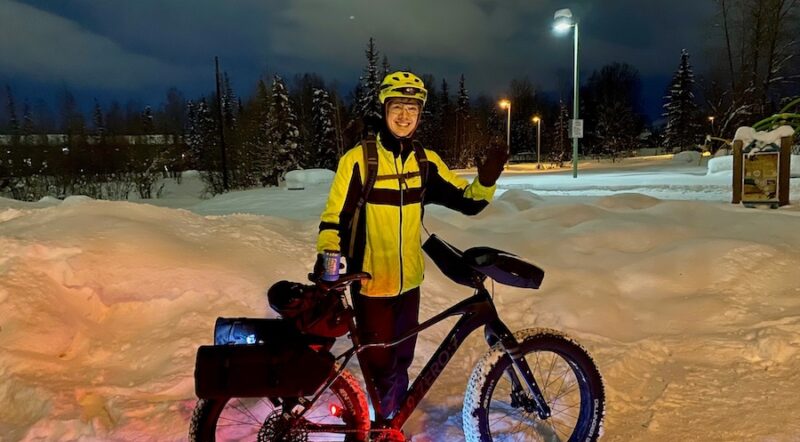Bipartisan Infrastructure Deal Misses Opportunity to Prioritize Walking and Biking as Essential
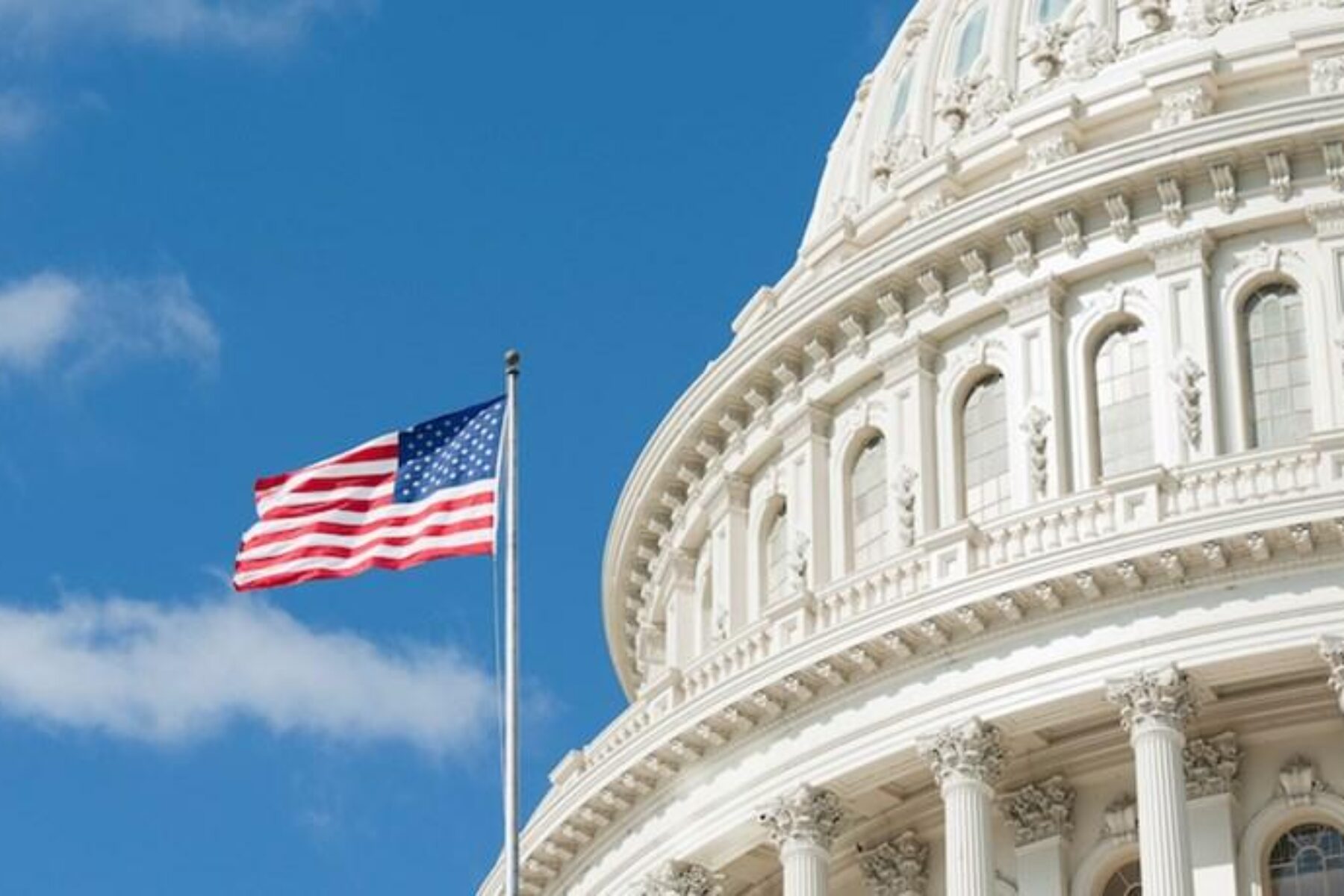
Breaking News – Oct. 1, 2021: The Infrastructure Investment and Jobs Act (IIJA) (H.R.3684) cleared the U.S. House of Representatives and will head to the White House, where the president is expected to sign the long-negotiated bipartisan infrastructure deal that includes reauthorization of the nation’s federal surface transportation bill. The Infrastructure Investment and Jobs Act increases funding for active transportation and establishes a new program to connect the nation’s trail and active transportation system. Learn more.
The U.S. Senate today passed the Infrastructure Investment & Jobs Act, the bipartisan infrastructure deal that has been painstakingly negotiated by the White House and moderates of both parties—negotiators who were not necessarily experts in transportation policy.
Rails-to-Trails Conservancy’s (RTC’s) analysis finds the end result to be lacking.
Despite huge additional spending on infrastructure, the Infrastructure Investment & Jobs Act does not deliver the dedicated active-transportation funding investments most needed to elevate active transportation as a priority mode of transportation. It fails to improve upon the baseline set for key programs in the transportation reauthorization bill passed by the Senate Committee on Environment and Public Works (EPW) in May.
Related: Senate Committee Advances Funding to Trail and Active Transportation Networks
The Senate’s passage of the bill, which does little to curb driving, comes on the heels of a bleak report on climate from the United Nations’ Intergovernmental Panel on Climate Change. The report calls for all greenhouse gas emissions to be zeroed out in an effort to protect against the worst impacts of climate change—a goal that simply cannot be met without getting more people out of their cars and making it more convenient for people to walk and bike where they need to go.
Unfinished Business for Dedicated Active Transportation Funding
For years, RTC has advocated for a package of bills that would deliver a transformative transportation reauthorization and provide the infrastructure needed to encourage more people to safely and conveniently walk and bike to everyday destinations. Our trio of dedicated funding bills provided the increased investment and policy changes needed to accelerate trail and active transportation network completion and maintain the nation’s trail system. We have long held that creating high quality, connected active transportation systems is the key to providing equitable and accessible transportation for everyone—even those who do not drive.
Fortunately, the infrastructure package largely incorporates the policies included in the EPW committee’s transportation reauthorization bill, which partially addressed this vision and provides most of the active transportation gains the deal delivers.
While the infrastructure package retains a sorely needed boost of more than 70% for the legacy program Transportation Alternatives that was included in the EPW bill, and changes the program from a fixed annual amount to 10% of the Surface Transportation Block Grant Program (STBGP), efforts to further increase STBGP as part of the infrastructure deal did not materialize. Freezing the STBGP allocation holds funding for Transportation Alternatives steady at the level set by EPW before the bipartisan infrastructure deal.
However, the most disappointing aspect for those of us focused on dedicated active transportation investments was the failure to commit new and innovative resources to walking and biking—investments that were included in the U.S. House of Representatives’ Invest in America Act, which passed in July but was left on the cutting room floor as the Senate and the White House negotiated their bipartisan deal. The unfinished business includes:
Active Transportation Connectivity Grants: This crucial, innovative new program, designed specifically to achieve mode shift by providing sizeable federal competitive grants to connect people to everyday destinations and between communities is authorized in the infrastructure package for $200 million/year, but funding remains dependent on annual appropriations. Efforts to fully fund these grants at $500 million/year and to provide guaranteed funding were rebuffed. In addition to preventing the House from negotiating for their version that uses the Highway Trust Fund as revenue, the bipartisan deal also could make it incrementally harder to secure annual appropriations because it guarantees other programs will get substantial general fund allocations.
Recreational Trails Program (RTP): RTP directs gas taxes paid by off-road recreational vehicles to trail building and maintenance. Pending a long overdue fuel study to inform the process, the Senate placeholder was to hold this program at the same $84 million/year allocation that it has received since 2009. The fuel study from the U.S. Department of Transportation (USDOT) Federal Highway Administration was released on the same day as the text of the Infrastructure Investment & Jobs Act was introduced. While the study found that recreational fuel taxes are more than $280 million/year, pointing to a $200 million/year shortfall in gas taxes collected that are not going to trail building and maintenance as intended, efforts to pass the Klobuchar-Risch Amendment 2616 that would have partially corrected for the underfunding were unsuccessful.
Amendment 2616, sponsored by Sens. Klobuchar and Risch, aimed to carry out Congressional intent to maintain a balance of investment between the two programs by allocating 91% for Transportation Alternatives and 9% for RTP. That split would still increase the Transportation Alternatives share as compared to current law and the House bill, which had slated both programs for a 75% increase. A vote on the amendment was not allowed.
StreetsBlog: Federal Recreational Trails Program Underfunded by $200M+ Per Year
House Invest Act Earmarks: Because the bill does not include any components of the House Invest Act, it leaves behind over $1 billion in Member Designated Projects (earmarks) that include active transportation elements, most of which are pegged to critical active transportation connections and represent around 20% of all earmarks included in the bill.
Some New Investments Can Offer New Competitive Opportunities
Despite the shortcomings of the Infrastructure Investment & Jobs Act’s overall investment in active transportation, the bill offers new investment—and new competitive opportunities for active transportation in two relevant programs:
Rebuilding American Infrastructure with Sustainability and Equity (RAISE): This multimodal USDOT discretionary grant program, formerly known as TIGER and BUILD, has supported the development of some ambitious trail, walking and biking networks over the past dozen years—but the reach of those funds for active transportation has been limited by fierce competition across modes, huge demand and limited budget. The infrastructure deal includes $7.5 billion in supplemental funding over five years for RAISE—a substantial increase given a $1 billion appropriation in FY 2021. Given that the USDOT this year has signaled priority for RAISE projects which advance climate, equitable access and safety goals, trails, walking and biking should be positioned to compete more strongly.
Safe Streets for All: This new initiative to support development and implementation of comprehensive safety action plans (or Vision Zero) gets bumped up from $200 million/year to $1 billion/year. The wording of this section fails to recognize opportunities to save lives by providing traffic-separated facilities outside of roadways, but the criteria governing priorities are fully consistent with such strategies. How this is interpreted by USDOT in issuing guidance and awarding grants will be important to its success.
The Big Disappointment
From a broader transportation reform perspective, the fundamental concern with the Infrastructure Investment & Jobs Act, which combines the recurring federal surface transportation reauthorization process with the White House priorities for a significant infrastructure bill, is that it failed to seize the opportunity to prioritize trails, walking and biking as essential infrastructure to advance the nation’s urgent need for a healthier, cleaner and more equitable transportation system. An increase in Transportation Alternatives is critical, but alone is insufficient to reorder transportation priorities to meet the challenges of our day.
At one point, the hope among transportation reform advocates, including RTC, was that surface transportation reauthorization would proceed first with a full conference negotiation to reconcile the strongest aspects of the bills from each chamber, then to be followed by a bill under reconciliation that could add further revenue to the most impactful programs. Now, transportation has been swallowed into the infrastructure deal without new resources for the most transformational investments and without entertaining policy innovations from the House.
Unfortunately, it appears that the Senate aims to force the House into a “take-it-or-leave-it” vote on the Infrastructure Investment & Jobs Act with no opportunity to shape the result through amendment or conference. That would leave behind the truly transformational reforms passed by the House that promised to provide greater accountability for climate, equity and safety goals and, in the process, reorder priorities to favor walking, biking and transit for their contributions to those goals.
What Happens Next?
At this point, the situation remains very fluid, so we can only offer predictions. Our understanding is that House is likely to condition passage of the Senate bill on first passing a reconciliation bill to address other aspects of President Biden’s American Jobs Plan, such as social programs. It remains to be seen whether the House tries to put its stamp on the Senate infrastructure deal or whether it will succeed if it does. Regardless, they will be under tremendous pressure from the White House to advance the package as is.
Assuming that the current bill passes the House as it now stands, our attention will shift to efforts to get missing pieces funded through the reconciliation bill and the appropriations process.
As efforts to reauthorize the federal surface transportation bill moved forward these past months, there was much to be optimistic about—progress in the Senate and significant political will in the House demonstrated that a revolution for trails, walking and biking is possible. Now, you can count on us to continue to advocate for visionary investments in a transportation future that prioritizes trails, walking and biking as essential.
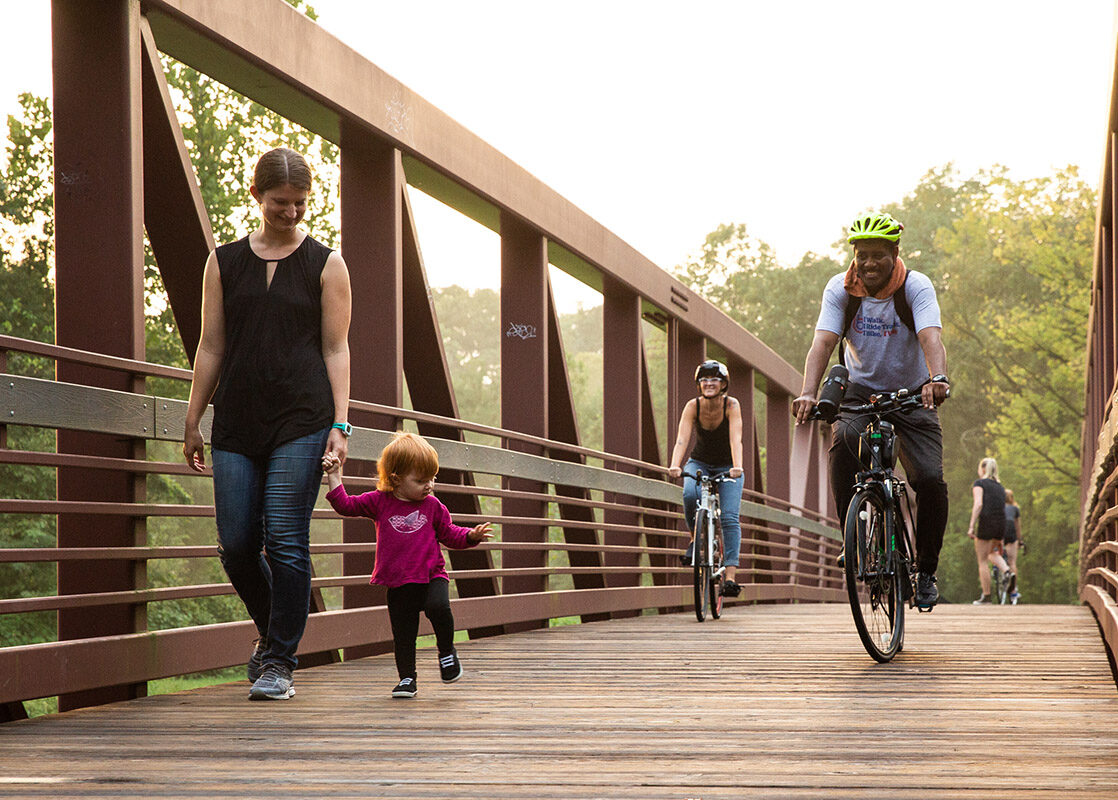
Donate
Everyone deserves access to safe ways to walk, bike, and be active outdoors.

